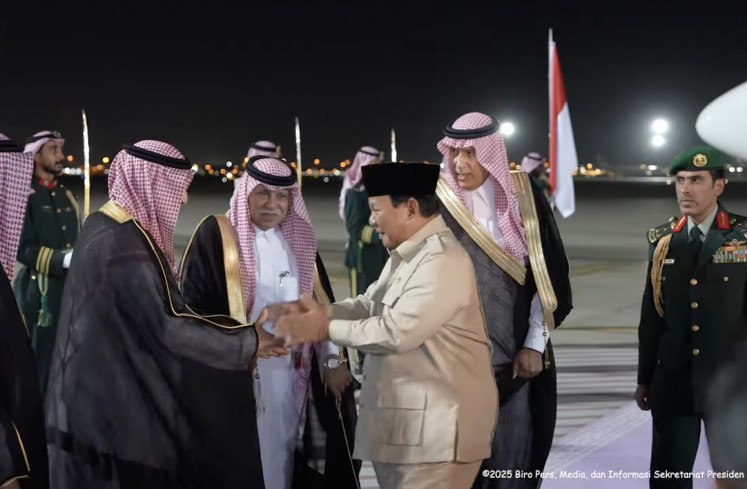Popular Reads
Top Results
Can't find what you're looking for?
View all search resultsPopular Reads
Top Results
Can't find what you're looking for?
View all search resultsMakarim Wibisono: Veteran RI diplomat chairs ASEAN Foundation
JP/Ricky YudhistiraAfter serving for a short time as an advisor to several domestic institutions, seasoned diplomat Makarim Wibisono found new life as he returned to the lime light and was appointed executive director of ASEAN (Association of Southeast Asia Nations) Foundation
Change text size
Gift Premium Articles
to Anyone

J
a href="http://">JP/Ricky YudhistiraAfter serving for a short time as an advisor to several domestic institutions, seasoned diplomat Makarim Wibisono found new life as he returned to the lime light and was appointed executive director of ASEAN (Association of Southeast Asia Nations) Foundation.
“I will not implement drastic changes within the organization. Through my role at the ASEAN Foundation I will aspire to contribute to the establishment of the ASEAN Community in 2015,” Makarim said.
The ASEAN Community is an integrated community resembling the European Union, marked by increasing political and economic interactions, including a single market, within the boundary of Southeast Asian countries.
The role of the ASEAN Foundation, which was established in 1997, is important in helping create the ASEAN Community, which ultimately aims at enhancing people’s well-being in the region.
“The Blue Print of the ASEAN Community will not be attained if all the activities in the regions are still government-centered,” he said. In this light, the organization could play a strategic role in enhancing person-to-person contact, which in turn helps increase the quality of human resources in a region. It could also lend a hand in helping tackle poverty and socio-economic disparity.
In the next three years, Makarim plans to enhance the “we” feeling among members of ASEAN country.
“When a Southeast Asian migrant worker is treated badly in a country outside Southeast Asia, for example, nobody in the region, except people from his or her home country, stands up to defend the fate of the migrant worker. It happens because the ‘we’ feeling is still largely absent in the mindset of Southeast Asian people,” said Makarim, who earned a PhD from Ohio State University, US.
It is deplorable because it is the “we” feeling that constitutes the most important factor in the creation of ASEAN Community due in 2015. To boost the “we” feeling among Southeast Asian people, Makarim pledged to enhance person-to-person contact in the region.
Therefore, Makarim’s priority in his three-year tenure is to work together with “opinion shapers”, namely think-tanks, journalists, the media, policy makers and others. One of his ideas is to create regular meetings among ASEAN editors to discuss important issues, such as what would be the possible architecture of ASEAN after the establishment of the ASEAN Community in 2015.
Other concrete ideas he wants to pursue during his tenure are to boost a united response from ASEAN countries when one of its members is struck by natural disasters such as tsunamis, enhance health cooperation among ASEAN countries — especially to improve migrant worker health, to approach conglomerates or large corporations to become more active philanthropists and help enhance the state of education in Southeast Asia.
Makarim, who was born on May 8, 1947, is second to none in his career in Indonesian diplomacy. After climbing up ladder of the ministry of foreign affairs, he landed several top positions at the ministry, including the role of Indonesian Permanent Representative for the United Nations between 2004 and 2007.
He was once considered the strongest contender for the job of foreign affairs minister, given his distinguished achievements, including being chairman of the United Nations Human Rights Commission and the first Indonesian who chaired the United Nations’ Economic and Social Council. After ending his chairmanship at the Human Right Commission at the United Nations in 2007, he served at the ministry of health as an advisor on International Cooperation.
His interest in diplomacy stemmed from his habit of strolling along Mataram Beach. While he was on the beach, he often looked at the horizon and wondered what was past it. Because he spent his childhood in Mataram, the capital of West Nusa Tenggara, which is close to the neighboring country of Australia, he also often listened to Australian radio stations, especially the Australian Broadcasting Corporation (ABC).
“The radio broadcaster often described what foreign countries looked like, and I was curious ever since,” recalled Makarim.
To make his dream come true, he studied International Relations at the Gadjah Mada University. After completing his studies in 1970, he applied for a position at the ministry of foreign affairs, but there were no vacant diplomatic posts at that time. He worked at the Ekspress news magazine as a reporter and editor there for two years and quit journalism when he was accepted at the ministry of foreign Affairs in 1972.
Makarim realized that he must be impartial as the executive director of the ASEAN Foundation. He should not fight for Indonesian interests per se, but consider the interests of all ASEAN countries as well.
“But, it is not a big deal because I got used to do it when I chaired the UN Commission on Human Rights,” he said.
Regarding Indonesia’s ASEAN chairmanship this year, Makarim said Indonesia could play a greater role through the foundation by committing regular funds to help spur organization projects.









